Profile by Jacob Cohn, August 2017
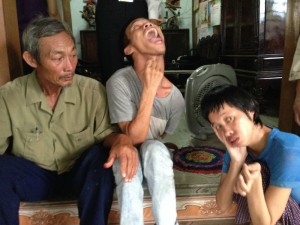 Mr. That left with his son Linh, 31, and daughter Pham, 37. Both have been severely handicapped by Agent Orange. We visit Mr. Phan That, another Agent Orange caregiver, who received financial assistance from AEPD in 2015. AEPD covered the cost of adding a second story to Mr. That’s house, to protect it against flooding.
Mr. That and his wife Hoang Thi Que both have a disability and have had health problems. They are also responsible for their son and daughter, who each are severely mentally handicapped, can barely walk and cannot speak or care for themselves. (Their healthy, married daughter and neighbors help with this care since Mr. That and his wife have trouble keeping up.) Mr. That says that he does some farming but it only brings in enough to cover costs for six months out of the year. Apart from this, he is dependent on government assistance and his military pension.
The family is very poor and unable to save money in case of a medical or other emergency. Mr. That would like a breeding cow and calf to raise, which could bring in significantly more money and allow them to properly care for their children. He says he hopes to develop a sustainable livelihood in order to be able to provide for his family in the long term.
The family lives along the Gianh River, in a village around 35 miles north of the provincial capital of Dong Hoi in a cluster of houses across the road from the river itself. The location has been a blessing and a curse for this family. As sea levels have risen, the Gianh has overflowed its banks more and more frequently. Mr. Luu, the AEPD outreach worker who serves families in this district, points out the second floor of Mr. That’s house as we arrive, telling me that it was added with AEPD support in 2015. This is a big help for the family. It means that when the house is threatened by floods—as happened late last year—the family can take shelter upstairs. But as I’m about to learn, this hasn’t made everyday life any easier.
Phan That is a man of around seventy, and unlike most Vietnamese men I’ve met, he is bearded, sporting a Ho Chi Minh-style goatee. Mr. That and his wife greet me politely but are somewhat less talkative than other AEPD beneficiaries I’ve visited. As we sit down to talk, another man arrives on a motorbike. He is introduced as Mr. Loc, a policy officer for the local government, who is in charge of working with this family and other persons with disabilities in the area.
During my conversation with Mr. That I notice that Mr. Loc is giving some of his responses for him, to a degree that’s never happened in any of my other visits, and for the first time since coming to Vietnam I briefly wonder if the government is trying to interfere with my work somehow. (Mrs. Que also doesn’t speak much, but that reflects a pattern I have seen in other families.) I don’t bring this up during the meeting, but afterwards, Mr. Luu tells me that Mr. That’s mind is slower than it used to be, and he sometimes has trouble keeping up with questions. Since Mr. Loc’s job is to work with disabled people, he knows this family well and is qualified to answer some questions on their behalf.
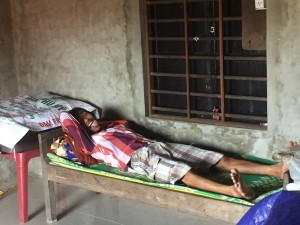 Mr. That’s son Linh at rest I ask Mr. That about his first experience with Agent Orange. He tells me that he was exposed to the poison during the American War while serving in the North Vietnamese military in Quang Tri, a province to the south around what used to be the Demilitarized Zone. He only came to realize the effect it would have on his family in 1979 when his first daughter Pham Thi Linh was born. She was severely mentally handicapped from birth. She has never been able to speak to or understand her parents, can move only with difficulty and has always required constant care.
Mr. That and Mrs. Que would go on to have two more healthy children, who are now married and live with their own families, but their fourth child, Pham Van Linh (born in 1985), has experienced the same symptoms as his sister. (Their youngest child, who lives on his own, has suffered from a mental condition that thanks to Google Translate I’m able to identify as schizophrenia, but the family isn’t sure that this is connected to Agent Orange.) There’s no cure for Pham Thi Linh and Pham Van Linh but doctors from the local clinic regularly check on them, and medication can make their lives more comfortable. (The tonal marks that distinguish their given names are not used in English, so I used their full names to avoid confusion.)
I ask about the family’s financial situation. Mr. That tells me that he has a small farm, which only brings in enough income to cover around six months’ worth of basic expenses. During the rest of the year, they’re dependent on government support and Mr. That’s military pension. Mr. Loc adds at this point that Agent Orange victims in this district receive a monthly welfare payment of 1,417,000 Vietnamese dong (around $62) per person as well as free health insurance. Nevertheless, Mr. That says that the family’s income only covers their day-to-day needs. They are unable to put money aside for the future and would be vulnerable to a future medical emergency or natural disaster. Mr. That and Mrs. Que have become less and less mobile with age, so taking care of their children is a struggle for them. They’re dependent on their healthy daughter, Luyen, who lives nearby with her own family and comes every day to take care of her brother and sister. Mr. That and Mrs. Que are anxious about what will happen when they are no longer able to care for themselves, let alone their children.
The topic turns to the support plan we’ve developed in partnership with Mr. That. AEPD and the Advocacy Project plan to raise money to buy the family a breeding cow and calf, which Mr. That will raise (with help from relatives and neighbors). He plans to eventually sell the calf and breed the cow again so that it will give birth to a new calf. The dung can also be used and sold as fertilizer for farm fields. Mr. Luu says that the income will depend on the type of cow and calf they end up purchasing, but that the animals could generate as much as 20 million Vietnamese dong ($880) per year. Based on what I’ve already been told, I can tell that this would be a big deal for the family.
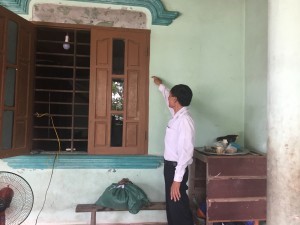 The ravages of climate change: Mr. Loc, from the local government, points to the spot where the last flood rose in the house. I ask about the problem of flooding, and Mr. Loc walks to the side of the house and points at a part of the wall around six feet above the ground. This was the water level during last year’s flood, and looking more closely I now see that the paint below this point looks slightly darker than above. Thanks to the improvements made with AEPD support, Mr. That says, the house is safer now, but the family needs to reinforce the tile roof with steel or iron to prevent water from getting in during future storms – something they currently can’t afford.
I ask whether Mr. That has any particular goals, and he says, through Mr. Loc, that he hopes to develop a self-sustaining business starting with the cow and calf. This would make it easier for him to take care of his two affected children. But when Mr. That and his wife become too old, Pham Thi Linh and Pham Van Linh will depend on their sister Luyen. Luyen eventually arrives as we are leaving to check up on her siblings.
Before we leave I ask to see the two children (even as I write this I’m reminded that, despite my use of the word “children,” both are in their thirties). Pham Thi Linh has her own small room on the first floor; Pham Van Linh’s is on the second. Pham Thi Linh sits on her bed, looking off to the side as we arrive. She turns to look at us and eyes me as her parents join her for a picture, but I can’t tell how much she understands. When I go upstairs I see Pham Van Linh lying on his own bed, eyes wide open and mouth agape. As his father enters the room, he gets up and walks with what looks like great difficulty. Again, I can’t tell how much he understands what’s happening, or how he feels about the situation. I leave without being able to promise anything to the family, but I tell Mr. That we’ll do what we can to get the cow and calf.
Update by Marcela De Campos, August 2018
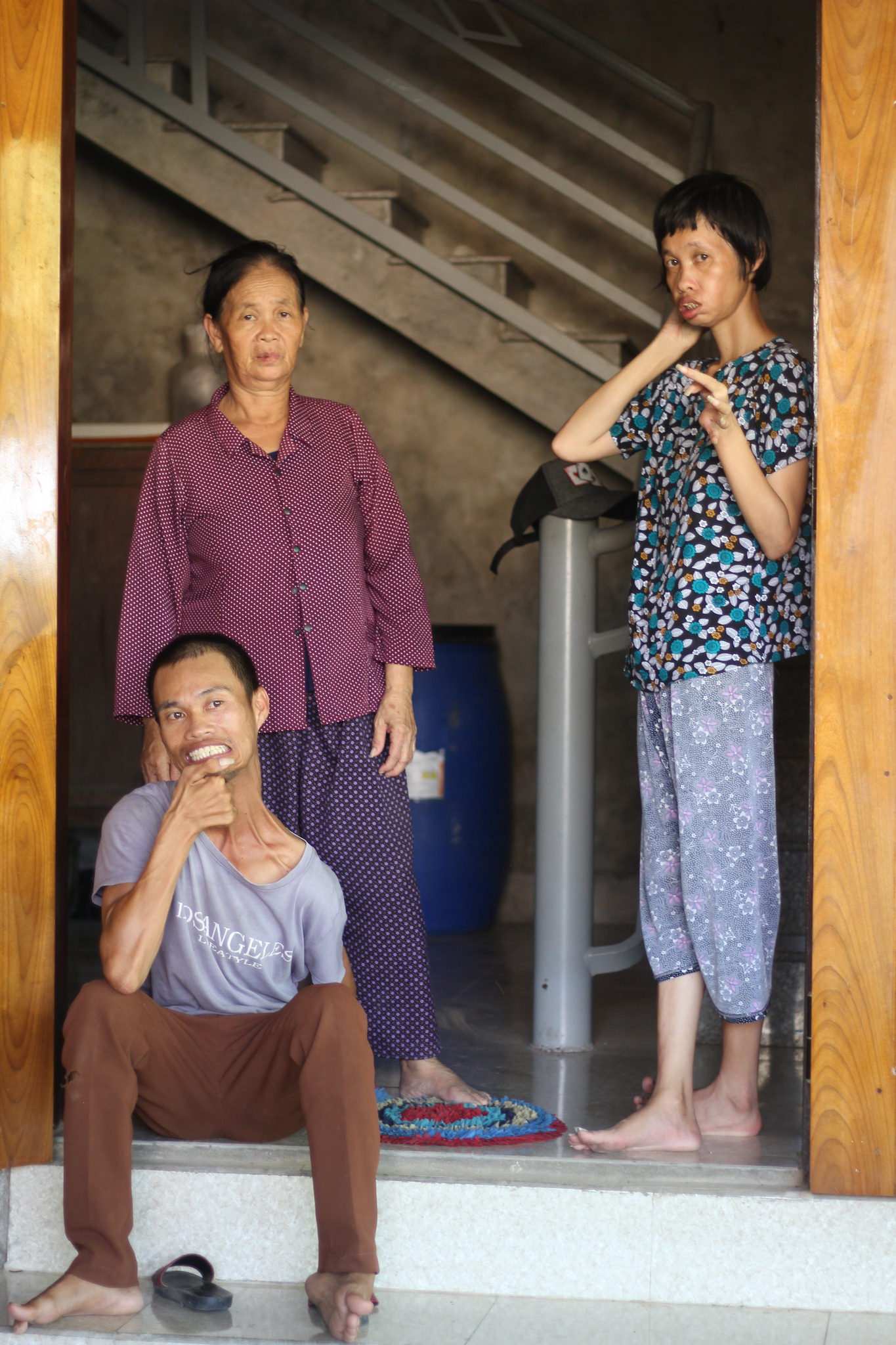 We visited Mr. That’s family on an exceptionally hot Wednesday afternoon and spoke with Ms. Hoang Thi Que. Mr That’s wife while he was out working in the fields and feeding the cow and calf. Mr. Thuan (Outreach Worker) seemed a little surprised that Mr. That was not available but we all understood that their livelihood will and should take precedence over a visit. Unlike other visits, however, this one felt rushed. Perhaps it was the result of the unrelenting heat and the sum of our fatigue, or learning about the difficult situations they are confronted with. Or maybe it was a meeting between people who are still building a rapport (see Jacob’s 2017 post for his initial interactions with the That family). Or maybe it was all of these things combined, or none. We visited Mr. That’s family on an exceptionally hot Wednesday afternoon and spoke with Ms. Hoang Thi Que. Mr That’s wife while he was out working in the fields and feeding the cow and calf. Mr. Thuan (Outreach Worker) seemed a little surprised that Mr. That was not available but we all understood that their livelihood will and should take precedence over a visit. Unlike other visits, however, this one felt rushed. Perhaps it was the result of the unrelenting heat and the sum of our fatigue, or learning about the difficult situations they are confronted with. Or maybe it was a meeting between people who are still building a rapport (see Jacob’s 2017 post for his initial interactions with the That family). Or maybe it was all of these things combined, or none.
This is not to say that the meeting went badly or that Ms. Que was not the epitome of a kind host – because she most certainly was. She went out of her way to set up a table and chairs so that we could all sit and chat. But throughout the conversation, even within her patient answers and explanations, I could feel a subtle hint of distress and mild irritation in her voice.
Ms. Que and Mr. That face great challenges. They are aging persons with disabilities responsible for caring for their adult children that have been severely affected by Agent Orange. Pham Thi Linh (38 years old) and Pham Van Linh (32 years old) their daughter and son respectively, have dioxin-related mental disabilities so severe they depend on their parents entirely. Their parents cannot support the family and depend on neighbors and their other daughter, Luyen, for any additional support. Coupled with this, Mr. That has suffered severe problems with his lungs a few months prior and went to Dong Hoi’s provincial hospital for a consultation. Two months ago the problems worsened and he almost passed away. The doctors have advised him to seek help in Hanoi but the family cannot afford the expense at this time.
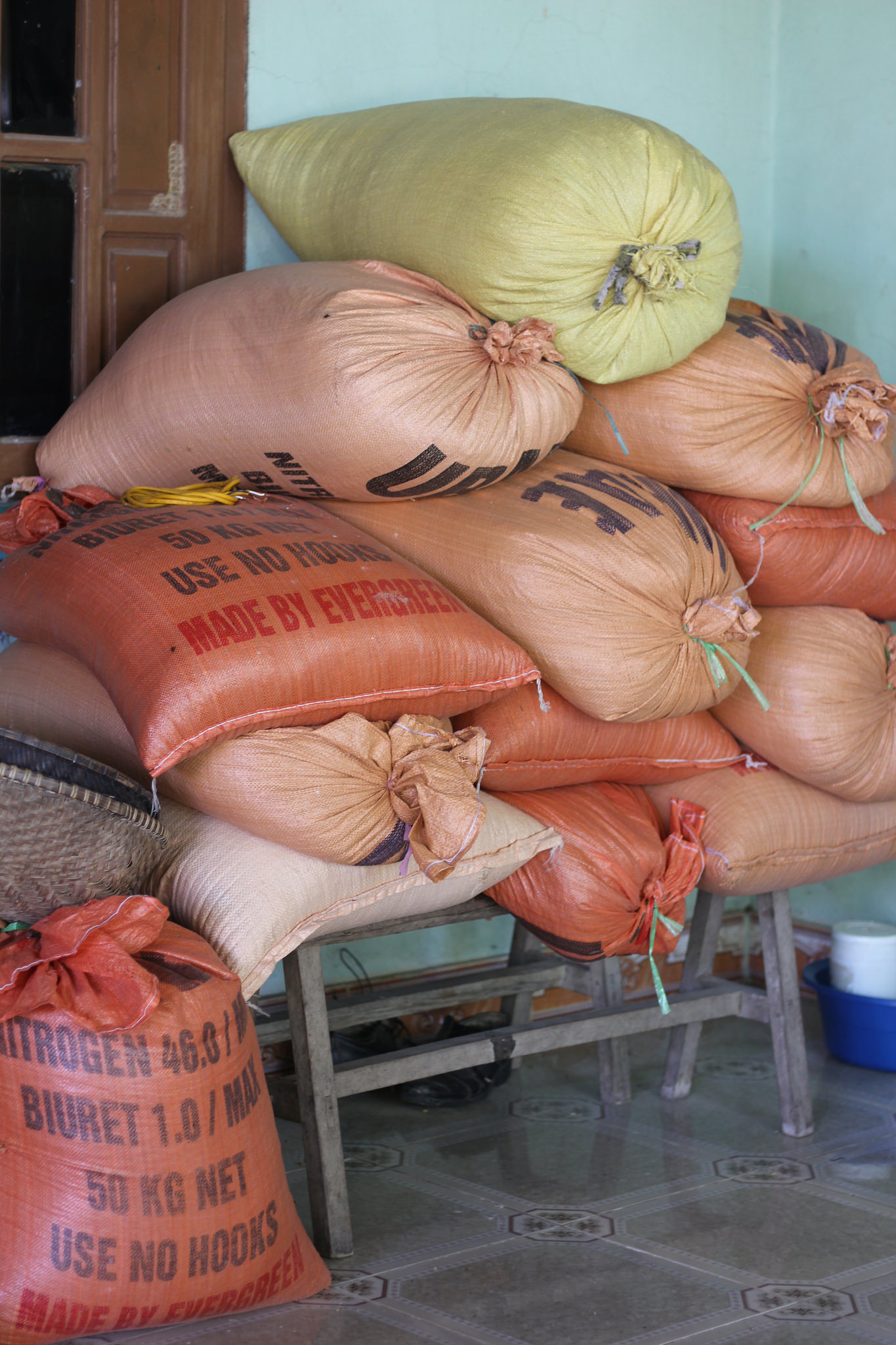 Ms. Que is worried for her husband and family. They secured a loan of 40M VND ($1,700 USD) from the local Women’s Union to pay for his treatment and are now in significant debt. Depending on the market value, the couple plans to sell the cow or calf to repay the loan in part. In addition, the family had to hire someone to help them harvest rice this year. This was an expense they had not anticipated because they usually work the fields themselves. The rice they farm is for consumption and lasts all year. Ms. Que is worried for her husband and family. They secured a loan of 40M VND ($1,700 USD) from the local Women’s Union to pay for his treatment and are now in significant debt. Depending on the market value, the couple plans to sell the cow or calf to repay the loan in part. In addition, the family had to hire someone to help them harvest rice this year. This was an expense they had not anticipated because they usually work the fields themselves. The rice they farm is for consumption and lasts all year.
Nonetheless, Ms. Que is still hopeful and proud to show us the large bags of rice they have collected in 2018. She reminds us that in addition to the cow or calf sale, the family still raises fish for income, using the cow’s manure as fish food. This is going well. Despite the adversity they face, the That family has developed a balance beeteen income generation and consumption that they are comfortable and confident with. We look forward to strengthening our relationship with them and supporting them in the future.
|